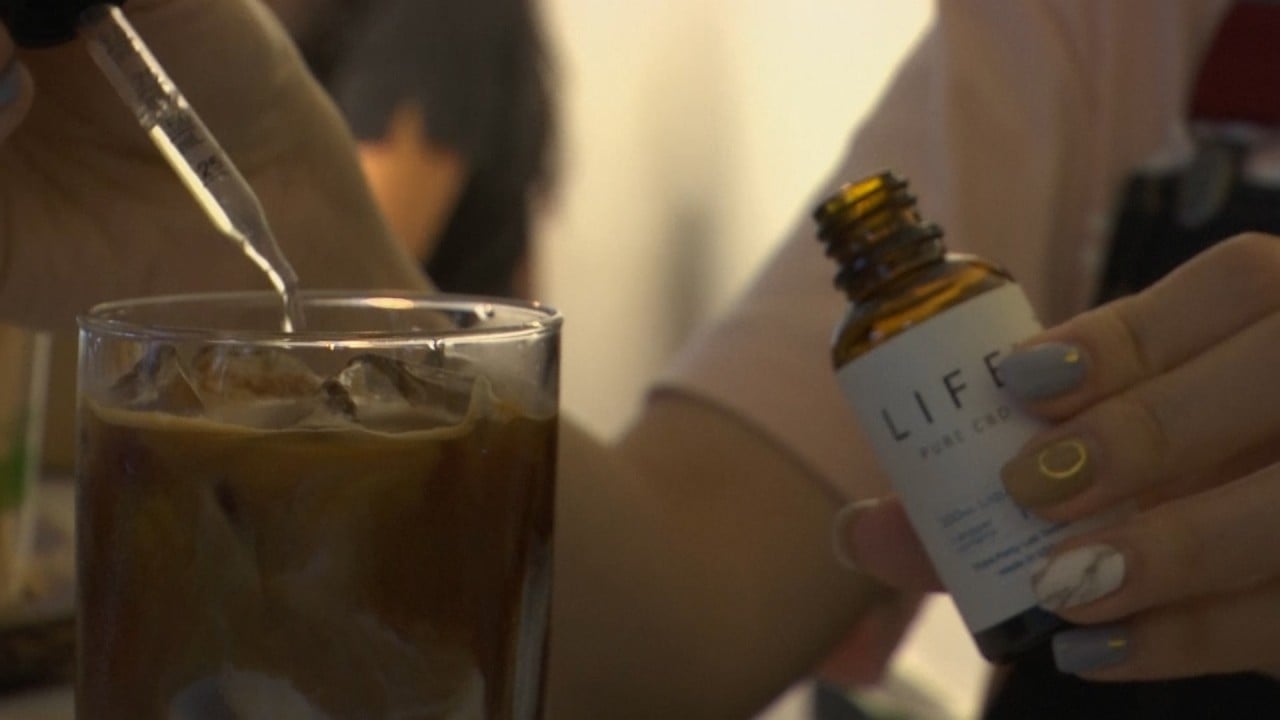
Hong Kong proposes banning CBD products within year, after one third of such items sold in city found to contain traces of illegal active ingredient in marijuana
- Security Bureau proposes listing CBD under Dangerous Drugs Ordinance in bid to prevent circulation of products with the substance in city
- Retailers, however, argue they should be allowed to sell CBD-infused products as long as items have been verified safe for use
Hong Kong’s law enforcement authorities have proposed banning CBD products within this year after finding that a third of such items sold in the city contain traces of an illegal active ingredient in marijuana.
But retailers have expressed reservations, arguing they should be allowed to sell such products as long as the items have undergone laboratory testing and are verified safe for use.
The Security Bureau had last week submitted a paper to the Legislative Council proposing amendments to list CBD – or cannabidiol, a substance derived from cannabis and its close relative, hemp – under the Dangerous Drugs Ordinance within 2022.
The changes, if approved, would prohibit the manufacture, import, export, supply, sale, possession and transshipment of products containing CBD in the city.
Use of CBD would be exempted if it was prescribed under the ordinance or with a licence issued by the Department of Health, the paper added.
“In recent years, there has been an uptake of consumption of cannabis. To prevent future long-term abuse, we will be taking a hard line against all dangerous drugs and cannabis,” Commissioner for Narcotics Kesson Lee told lawmakers on the Security Panel on Tuesday.
He said “reasonable time”, such as three months, would be given to consumers and businesses to dispose of the products or use them before the amendments took effect.
Since 2019, about one-third – or more than 4,100 items – of the CBD product samples tested at the government laboratory were found to contain Tetrahydrocannabinol (THC), the main psychoactive substance found in cannabis, according to figures cited in the paper.
Does CBD oil make me high? Does it help me sleep? Enthusiasts bust myths
Authorities have long taken a zero-tolerance approach to any amount of cannabis and products that contain THC, citing health hazards and addiction concerns.
Currently, the use of CBD is legal in the city, and there has been an increasing trend of products being infused with the substance. Restaurants and shops have also used it as a marketing gimmick, saying it can promote wellness and relieve stress.
CBD oil, depending on its usage and amount, is usually priced from HK$150 to HK$480, while CBD-infused beverages cost about HK$40 to HK$55.
Lee said, however, there were no official figures to show CBD consumption trends in the city.
It was also difficult to completely remove THC impurities from CBD isolates, Lee said, adding that CBD might naturally decompose or be purposely converted into THC.

The decomposition of CBD to THC could take place even under normal storage conditions as it was not protected against air and moisture, the paper said.
According to Lee, mainland China has since last year banned the use of CBD in cosmetic products and food.
Although most of the lawmakers supported the proposed amendments, industry players expressed reservations.
“The legislation is an across-the-board approach. I think there is still room for discussion. The current regulation is enough [to protect residents from THC],” said Keith Wong Tsz-wai, executive director of the Community Drug Advisory Council.
Wong suggested instead an alternative law to require businesses to conduct laboratory tests to ensure THC was not included in their products.
Hong Kong police seize 1,500 CBD items after detecting traces of THC inside
The licensed social worker said he had not heard of cases where the use of CBD would lead people to also consume cannabis. He added that it was a “myth” that cannabis users would resort to CBD to help reduce health effects caused by the drug.
Anthony To, one of the owners of Cannable, a CBD spa and treatment shop in Sheung Wan, said there was no alternative for his store but to give up using CBD products if the proposed amendments were passed.
The CBD items his store used had passed laboratory tests certifying they did not contain THC, he added.
“We were quite shocked,” he said. “This is because many countries have legalised the use of CBD. We have not seen any place [city] banning its use.”
Another owner of a shop selling CBD oils said the proposed ban was bad news for the industry.
“CBD products have been helping people with sleeping problems, as they can use them instead of painkillers to help them sleep naturally,” said the owner, who wanted to remain anonymous.
The store had been clearing its stock of CBD products by selling them at discounted prices, and had already stopped importing them. It would send any remaining goods back to suppliers if the amendments were passed, the owner added.
More than 200 substances, such as cocaine, cannabis, crystal meth, heroin and ketamine, are classified as dangerous drugs in the city. In Hong Kong, possession of a dangerous drug is punishable by imprisonment for up to seven years and a HK$1 million (US$127,000) fine.



